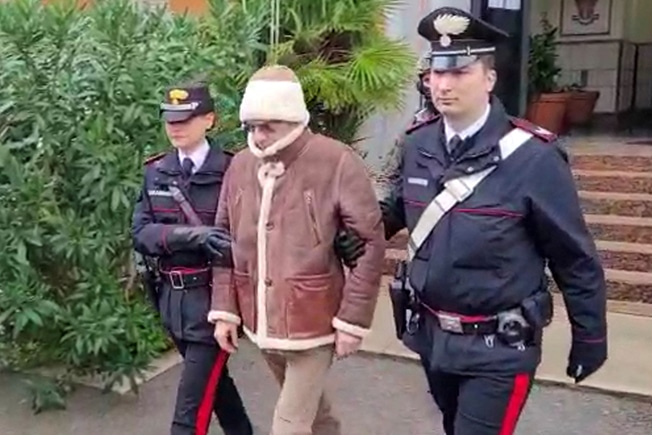Italy’s most wanted mafia boss, Matteo Messina Denaro, was arrested by armed police at a private hospital in Sicily on Monday, where the man who has been on the run since 1993 was being treated for cancer.
Nicknamed “Diabolik” and “‘U Siccu” (The Skinny One), Messina Denaro had been sentenced in absentia to a life term for his role in the 1992 murders of anti-mafia prosecutors Giovanni Falcone and Paolo Borsellino, crimes that shocked the nation and sparked a crackdown on Cosa Nostra.
Messina Denaro, 60, was led away from Palermo’s “La Maddalena” hospital by two uniformed carabinieri police and bundled into a waiting black minivan. He was wearing a brown fur-lined jacket, glasses and a brown and white woolly hat.
Judicial sources said he was being treated for cancer and had an operation last year, followed by a series of appointments under a false name.
“We had a clue to the investigation and followed it through to today’s arrest,” Palermo prosecutor Maurizio de Lucia said.
Magistrate Paolo Guido, who was also in charge of investigations into Messina Denaro, said dismantling his network of protectors was key in reaching the result following years of work.
A second man who had driven Messina Denaro to the hospital was arrested at the scene on suspicion of aiding a fugitive.
Images on social media showed locals applauding and shaking hands with police in balaclavas as the minivan carrying Messina Denaro was driven away from the suburban hospital to a secret location.
Italian Prime Minister Giorgia Meloni travelled to Sicily to congratulate police chiefs after the arrest.
“We have not won the war, we have not defeated the mafia but this battle was a key battle to win, and it is a heavy blow to organised crime,” she said.
Maria Falcone, sister of the murdered judge, echoed that sentiment.
“It proves that mafiosi, despite their delusions of omnipotence, are ultimately doomed to defeat in the conflict with the democratic state,” she said.
FAST CARS, FLASHY CLOTHES
Messina Denaro comes from the town of Castelvetrano near Trapani in western Sicily, and is the son of a mafia boss.
Police said last September that he was still able to issue commands relating to the way the mafia was run in the area around Trapani, his regional stronghold.
Before he went into hiding, he was known for driving expensive cars and his taste for wearing finely tailored suits and Rolex watches.
He faces a life sentence for his role in bomb attacks in Florence, Rome and Milan that killed 10 people in 1993 and is accused by prosecutors of being solely or jointly responsible for numerous other murders in the 1990s.
In 1993 he helped organise the kidnapping of a 12-year-old boy, Giuseppe Di Matteo, in an attempt to dissuade his father from giving evidence against the mafia, prosecutors say. The boy was held in captivity for two years before he was strangled and his body dissolved in acid.
The arrest comes almost 30 years to the day since police arrested Salvatore “Toto” Riina, the Sicilian Mafia’s most powerful boss of the 20th century. He eventually died in jail in 2017, having never broken his code of silence.
“It is an extraordinary event, of historic significance,” said Gian Carlo Caselli, who was a prosecutor in Palermo at the time of Riina’s arrest.
Despite the euphoria, Italy still faces a struggle to rein in organised crime groups whose tentacles stretch far and wide.
Experts say that Cosa Nostra has been usurped by the ‘Ndrangheta, the Calabrian mafia, as the most powerful organised crime group in Italy.
“There is a sense that the Sicilian Mafia is not as strong as it used to be, especially since the 90s, they have really been unable to enter the drug market and so they are really second-fiddle to the ‘Ndrangheta on that,” said Federico Varese, Professor of Criminology at Oxford University.







Click here to change your cookie preferences